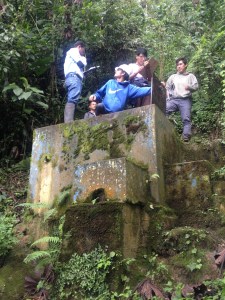Tis the season! It’s Navidad, and that means chocolatadas! What are chocolatadas? Apparently I didn’t really know, despite having already spent 2 Christmases here.
I thought a chocolatada was just a Christmas gathering with hot chocolate and Paneton. That’s right – hot chocolate (made from chocolate bars, milk, and cinnamon and cloves), and Panetón are the key ingredients for a chocolatada, and it is how we usually celebrate Christmas Eve here (in addition to staying up until midnight and exchanging gifts at midnight Christmas Eve).

So, since it is the Christmas season, and I wanted to reward the hard work of the 2 best water committees in our district, I thought it would be a great idea to reward them with a chocolatada in their community!


So off I went to purchase Panetón, chocolate, milk, and cinnamon and cloves. But people kept dropping comments like, “the kids will love it!”, and “the children love their dolls and cars from the last chocolatada”, and “what will you give the kids”?
So slowly I started realizing that typically chocolatadas (as organized community events) are a celebration for the kids. And you have to bring gifts. Dude, I was not prepared for that! I thought I was just planning something for all the adults that had worked hard to bring clean water to their community, but actually, when I had said “chocolatada”, their expectations were that I was throwing a party for the kids…and that I was going to bring gifts for all the kids! (Oh my.)
Well, one of the key lessons of Peace Corps is to be flexible and take advantages of unexpected changes. Luckily, my counterparts came to the rescue and found some bubbles to give as gifts to the kids, and we all pitched in to pay for them.
And, because the focus was kids, I took the opportunity to give a hand-washing lesson with my counterparts. We did an “arts and crafts” activity showing the kids how to make a portable hand washing station out of a water bottle, (and made sure that everyone washed their hands before eating).
We used the gift-giving activity as a training opportunity and the kids had to answer questions about when and why to wash their hands before receiving their gift of bubbles. (I think I was the only one who appreciated the irony that bubbles were the perfect gift for a hand-washing training).

I think after everything, it turned out pretty well, but I still didn’t really “get” the chocolatada idea, until I attended one planned by the community a few days later. Apparently, I still hadn’t learned that “Christmas is for the kids” (as everyone says), and chocolatadas too. So while I went to the celebration prepared to chat with the adults and munch on some paneton and hot chocolate…that’s not quite what happened.
When they started the party, the host welcomed everyone and gave a special welcome to me “Ingeniera” (“Engineer” is the title they call you if you have an engineering degree). And it didn’t stop there, after welcoming me, they said, only half jokingly, “and the Inginiera will help “animar” the fiesta”. “Uh-oh, what did I get myself into!?” I said to myself. It’s common – ok it’s more than common – just about every kid’s party here has a clown to “animar” the fiesta. And that’s what I thought of when they said that I would “animar” the fiesta. If you know me, you know I’m not exactly clown material.
Well, I joined Peace so that I would be forced to step out of comfort zone, so here I am. I guess there’s not much else to do, I said to myself, and I joined the 10-15 kids in the middle of the room, and started leading them to dance in a circle, and do different silly things to get them moving. Luckily Peace Corps had taught us a few interactive activities so I had a few ideas to draw from. After an hour I was exhausted (especially since I had already ridden my bike 30 minutes and uphill (and backwards through the snow) to arrive in the community)!
After an hour of the adults sitting around the perimeter of the room watching me and two other woman entertain the kids, they finally started to serve the Paneton and hot chocolate. And later, they gave out Barbie dolls and t-shirts to all the kids.

Finally, I think I understand the chocolatada…it is like a typical kid’s birthday party here, except with Paneton and hot chocolate, and all the kids get presents at the end, instead of just one!











 These jovenes, (young adults) were great! They had really thoughtful answers and were very respectful, and they all participated! I want to share a few of the questions and their responses, because it shows that times are changing and the younger generations are learning about and thinking progressively about gender equality, health, the environment, and their communities.
These jovenes, (young adults) were great! They had really thoughtful answers and were very respectful, and they all participated! I want to share a few of the questions and their responses, because it shows that times are changing and the younger generations are learning about and thinking progressively about gender equality, health, the environment, and their communities.

